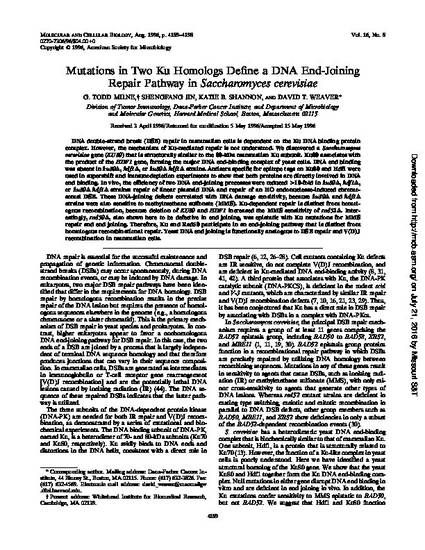
DNA double-strand break (DSB) repair in mammalian cells is dependent on the Ku DNA binding protein complex. However, the mechanism of Ku-mediated repair is not understood. We discovered a Saccharomyces cerevisiae gene (KU80) that is structurally similar to the 80-kDa mammalian Ku subunit. Ku80 associates with the product of the HDF1 gene, forming the major DNA end-binding complex of yeast cells. DNA end binding was absent in ku80Δ, hdf1Δ, or ku80Δ hdf1Δ strains. Antisera specific for epitope tags on Ku80 and Hdf1 were used in supershift and immunodepletion experiments to show that both proteins are directly involved in DNA end binding. In vivo, the efficiency of two DNA end-joining processes were reduced > 10-fold in ku80Δ, hdf1&Delta, or ku80Δ hdf1Delta; strains: repair of linear plasmid DNA and repair of an HO endonuclease-induced chromosomal DSB. These DNA-joining defects correlated with DNA damage sensitivity, because ku80Δ and hdf1Δ-strains were also sensitive to methylmethane sulfonate (MMS). Ku-dependent repair is distinct from homologous recombination, because deletion of KU80 and HDF1 increased the MMS sensitivity of rad52Δ. Interestingly, rad50Δ, also shown here to be defective in end joining, was epistatic with Ku mutations for MMS repair and end joining. Therefore, Ku and Rad50 participate in an end-joining pathway that is distinct from homologous recombinational repair. Yeast DNA end joining is functionally analogous to DSB repair and V(D)J recombination in mammalian cells.
- Double Stranded DNA,
- Controlled Study,
- DNA Repair,
- DNA Strand Breakage,
- Fungus Mutant,
- Gene Deletion,
- Genetic Recombination,
- Human,
- Human Cell,
- Nonhuman,
- Saccharomyces cerevisiae,
- Sequence Homology,
- Amino Acid Sequence,
- Antigens, Nuclear,
- Base Sequence,
- DNA Helicases,
- DNA Primers,
- DNA, Fungal,
- DNA-Binding Proteins,
- Epistasis, Genetic,
- Fungal Proteins,
- Genes, Fungal,
- Molecular Sequence Data,
- Nuclear Proteins,
- Saccharomyces cerevisiae Proteins,
- Sequence Alignment,
- Sequence Homology, Amino Acid,
- Structure-Activity Relationship
Available at: http://works.bepress.com/katie_shannon/15/
